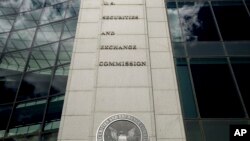U.S. anti-foreign bribery enforcement activity perked up last year after trending down for three consecutive years, according to a new report from TRACE International.
The U.S. Justice Department and the Securities Exchange Commission, the two agencies responsible for enforcing anti-foreign bribery laws, brought a total of 11 enforcement actions in 2022, up from eight in 2021, the report said.
TRACE International, which helps businesses comply with anti-graft laws, defines an enforcement action as a “final resolution” of a foreign bribery allegation.
Foreign bribery is the bribing of government officials in any country by a company or individual in another country.
Other researchers, using a broader definition of enforcement, show a higher number of actions taken by U.S. agencies last year.
The Justice Department and the SEC investigate allegations of foreign bribery under the 1977 Foreign Corrupt Practices Act.
The law, which makes it a crime to bribe a foreign government official, gives the two agencies broad jurisdiction over foreign companies that have subsidiaries in the United States or trade on U.S. stock exchanges. That means U.S. prosecutors can bring charges against the employees of a company that is headquartered in a foreign country.
Historically, the United States has been a leader in fighting foreign corruption, investigating more cases than any other country in the world.
But in recent years, U.S. anti-foreign bribery enforcement activity has been on the decline, and last year’s uptick “did little to offset the downward trend,” TRACE said in its report.
Anti-foreign corruption activity by other countries has followed a similar pattern in recent years, falling moderately last year, according to the report, which also showed a slight decline in the number of open investigations of foreign bribery around the world.
Nevertheless, TRACE President Alexandra Wrage said, “I think we can have some confidence that the whole world is taking anti-corruption more seriously than they did a decade ago.”
In an ironic twist of sorts, increased cooperation between U.S. and foreign law enforcement agencies in recent years has had the unintended effect of slowing down the pace of already time-consuming investigations. As a result, investigations that were opened five or six years ago have yet to be concluded.
“The U.S. agencies … are really prioritizing cooperation with foreign counterparts and trying to avoid what they call ‘the piling on’ of multiple prosecutions for the same bad acts, and as a result of that they can take much longer to prosecute,” Wrage said in an interview with VOA.
In a case coordinated among authorities in the U.S., the U.K. and Brazil, Swiss mining and commodity giant Glencore International A.G. agreed last year to pay more than $1.1 billion to resolve the U.S. government’s investigations into bribery and price manipulation.
Glencore faced charges of engaging in a decade-long conspiracy to pay more than $100 million to third-party intermediaries, intending a portion of the money to be used to bribe officials in Nigeria, Cameroon, Ivory Coast, Equatorial Guinea, Brazil, Venezuela, and the Democratic Republic of the Congo.
In another internationally coordinated case, U.S.-based waste management company Stericycle Inc. agreed to pay $84 million to resolve parallel investigations by U.S. and Brazilian authorities into the bribery of foreign officials in Brazil, Mexico, and Argentina.
In recent years, the Justice Department has revitalized a policy of targeting individuals involved in corporate corruption.
In a speech earlier this month, Deputy Attorney General Lisa Monaco said the agency’s “focus on individuality accountability has paid off.”
Last year, the Justice Department’s fraud section secured more individual convictions than in any of the previous five years, Monaco said.
But that policy has tended to slow things down, Wrage said.
“Whereas companies settle very quickly, individuals tend to fight because their liberty is on the line,” Wrage said.





